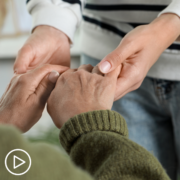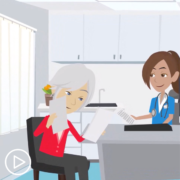CAR T-Cell Therapy | Monitoring for Side Effects As a Care Partner
CAR T-Cell Therapy | Monitoring for Side Effects As a Care Partner from Patient Empowerment Network on Vimeo.
How can care partners monitor side effects from CAR T-cell therapy? Nurse practitioner Daniel Verina discusses the unique aspects of CAR T-cell therapy, guiding care partners on recognizing side effects like cytokine release syndrome and neurological changes, emphasizing communication with healthcare providers.
Daniel Verina is a nurse practitioner at the Center of Excellence for Multiple Myeloma at Mount Sinai Tisch Cancer Center in New York City.
See More from The Care Partner Toolkit: CAR T-Cell Therapy
Related Resources:
Transcript:
Katherine Banwell:
Is there anything you’d like to add about care partners and what they should know about the CAR T-cell process?
Daniel Verina:
Absolutely. That some of the CAR T experience is that when patients reach the CAR T, they may already have a stem cell transplant earlier in their life, an autologous stem cell transplant. So, I will guide them and say there were some similar characteristics, meaning that there’s collection, there’s chemotherapy, and there’s a stay in the hospital.
But some of the differences that their blood counts may not return as quickly as they did with an auto stem cell transplant. So, they may see lower counts. After a month or two, they may start to drop. So, to expect that some of these changes are normal or part of our pathway.
But also, things that we need to look for and a caregiver should understand, that there are delayed effects, like cytokine release syndrome, or neurotoxicity’s that we see with CAR T can happen a couple of months down the line. So, one of the important tools that a caregiver should have to watch and monitor patients longer on is being able to look for these toxicities. And there are many tools out there that are available through the IMF or the MMRF that the caregiver can say they’re not remembering as well, or I feel like they’re word searching.
Even though the patient may come to us and sound and answer the questions appropriately, the caregiver says, you know what, I just feel like there’s something different. And that’s a cue for us. I always call them the truth serum. The caregiver to me is the truth serum in the room. So, I think one of those things is really teaching them to look for delayed side effects or adverse events that may occur even four, five, six months later.
Katherine Banwell:
Can you give us an idea of what sort of side effects the care partner should be looking for?
Daniel Verina:
So, in the hospital, patients can experience what we call cytokine release syndrome or fevers, fast heart rate, low blood pressures. And that could occur upfront, but it could happen later on in life. Certain things also are neurotoxicity. So, having persistent headaches, memory loss, word searching, sometimes change in their gait, and sometimes even a little bit of a handshaking or tremor.
So, neurological changes. Shuffling they may see. Weaknesses in their legs, things like that. So, they used to get up out of the chair very quickly, and now it takes them longer to do that. And those are signs that they should be calling their primary CAR T physicians and saying, “I’m seeing a change,” because the further out they go and if they’re doing successfully, we see them about every month or so compared to when they come out of the hospital. So, you want to alert the caregiver to call us as quickly and not wait until the next appointment. You never know.













